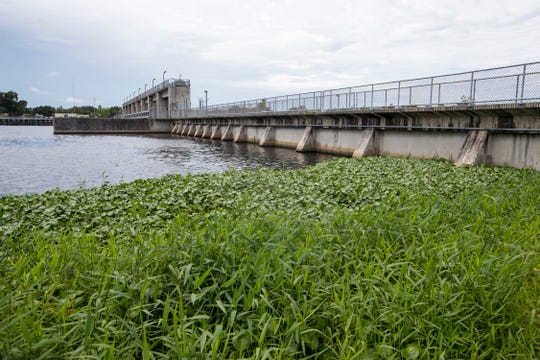New ALS research implicates blue-green algae toxin, offers hope that amino acid can help
News Press Article: https://www.news-press.com/story/tech/science/environment/2020/02/24/blue-green-algae-toxin-linked-als-new-research-implicates-toxin/4824614002/
Sharon Isern, a molecular virologist at FGCU, and her student Alicia Belony are looking for naturally-occurring viruses to combat blue-green algae. Fort Myers News-Press
A study published Friday connects a toxin produced by some blue-green algae to Lou Gehrig’s disease – while also showing that an amino acid may protect against its ravages.
When vervet monkeys were dosed with BMAA, a neurotoxin produced by cyanobacteria, changes in their bodies mirrored what happens to people in the early stages of Lou Gehrig’s, also called amyotrophic lateral sclerosis, or ALS.
Monkeys given BMAA along with the amino acid did much better, said the paper’s lead author David Davis, of the University of Miami’s Miller School of Medicine who served as first author on the paper. "In animals dosed with L-serine, the progression of these ALS-like changes was considerably reduced."
Scientists identified a genetic risk associated with Lou Gehrig's disease, also referred to as ALS, amyotrophic lateral sclerosis. Wochit
Researchers have found BMAA as well as other toxins in the cyanobacteria blooms that periodically slime south Florida.
The study, published in the Journal of Neuropathology and Experimental Neurology, follows an earlier one published by Davis and others in 2016 that showed BMAA can also cause brain changes that resemble Alzheimer’s.
Read: Health department will post warning signs for blue-green algae spotted in Calossahatchee
This research offers broader implications for human health, wrote Dr. Larry Brand, a university of Miami professor of marine biology who has researched BMAA, though he wasn’t affiliated with this study.
"These vervets were exposed to the same cyanobacterial toxin that was found
in the brains of beached dolphins with Alzheimer's neuropathology," Brand wrote in an email. "This is one more indication that we need to carefully monitor the health effects of exposure to cyanobacterial blooms."
ALS is a “terrible paralytic disease” that hits people in the prime of life, said prominent Wyoming researcher Paul Cox, executive director of the Brain Chemistry Labs in Jackson Hole. It causes increasing paralysis that often results in death within a few years of diagnosis. So far, patients only have access to two drugs that don’t greatly slow the disease’s progress, but the new study offers the possibility that L-serine may slow it more.
“Once L-serine is added to (monkeys’) diets, they had a really reduced pathology,” said Cox, whose lab is working to patent a formulation of the amino acid. “So L-serine appears to be neuroprotective … that explains why we see that in clinical trials of our human patients.”
The Franklin Locks bridge on August 14, 2019, nearly one year after toxic blue-green algae plagued the area. (Photo: Amanda Inscore - Fort Myers News-Press)
FGCU algae scientist Barry Rosen points out that the amount of BMAA the monkeys were given was “enormous … an extraordinarily high dose.
“I am not denying they saw an effect in the tissues, and perhaps the L-serine provided some protection,” Rosen wrote in an email. “However, we as humans don’t have this kind of exposure.”
Researchers are working to document just how much exposure there is. An FGCU study has found aerosolized BMAA in air samplers up to the last four years. Cox's lab has been analyzing samples taken from the Caloosahatchee and elsewhere in south Florida "when they release these nutrient rich waters from Lake Okeechobee."
Other studies have shown people who live next to waterbodies with frequent toxic algal blooms have a 25% greater risk of developing ALS.
“And now we know why,” Cox said.
“So on one hand,” he said, “it’s bad news that we know this toxin triggers ALS, but the good news is now that we know, we can get serious about cleaning up the water.”
Southwest Florida volunteers take part in algae exposure study Fort Myers News-Press

